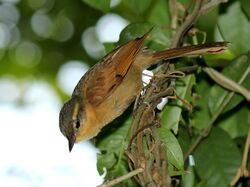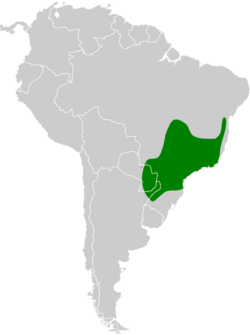Biology:Ochre-breasted foliage-gleaner
| Ochre-breasted foliage-gleaner | |
|---|---|

| |
| At São Sebastião, São Paulo, Brazil | |
| Scientific classification | |
| Domain: | Eukaryota |
| Kingdom: | Animalia |
| Phylum: | Chordata |
| Class: | Aves |
| Order: | Passeriformes |
| Family: | Furnariidae |
| Genus: | Anabacerthia |
| Species: | A. lichtensteini
|
| Binomial name | |
| Anabacerthia lichtensteini (Cabanis & Heine, 1860)
| |

| |
| Synonyms | |
|
Philydor lichtensteini | |
The ochre-breasted foliage-gleaner (Anabacerthia lichtensteini) is a species of bird in the Furnariinae subfamily of the ovenbird family Furnariidae. It is found in Argentina , Brazil , and Paraguay.[2][1]
Taxonomy and systematics
The ochre-breasted foliage-gleaner was previously included in genus Philydor but a 2011 paper made it plain that it did not belong there. The same paper found the white-browed foliage-gleaner (A. amaurotis) and the ochre-breasted to be sister species.[3]
The ochre-breasted foliage gleaner is monotypic.[2]
Description
The ochre-breasted foliage-gleaner is 15 to 17 cm (5.9 to 6.7 in) long and weighs 18 to 24 g (0.63 to 0.85 oz). It is a medium-sized furnariid with a wedge-shaped bill that is the shortest in its genus. The sexes have the same plumage. Adults have an ochraceous eye ring and sharply defined supercilium, a dark brownish band behind the eye, dull rufous-ochre ear coverts, and pale brownish lores. Their crown is dull gray-brown with vague paler streaks, their back rufescent brown, and their rump and uppertail coverts a slightly lighter rufescent brown. Their tail is mostly rufous with rufescent brown outer webs on the innermost pair of feathers. Their wings are rufous brown with duskier tips on the flight feathers. Their throat and malar area are bright ochraceous buff, their upper breast a richer ocraceous buff, and the rest of their underparts a duller ocraceous buff. Their iris is brown, their maxilla brownish gray, their mandible light gray, and their legs and feet greenish gray. Juveniles have less uniformly colored underparts than adults, and those feathers have grayish tips.[4][5]
Distribution and habitat
The ochre-breasted foliage-gleaner is found in southeastern Brazil from Bahia, Goiás, and Mato Grosso do Sul south into Rio Grande do Sul, in eastern Paraguay, and in northeastern Argentina's Misiones Province. It inhabits montane evergreen forest and tall secondary forest. In elevation it ranges from sea level to 800 m (2,600 ft).[4][5]
Behavior
Movement
The ochre-breasted foliage-gleaner is a year-round resident throughout its range.[4]
Feeding
The ochre-breasted foliage-gleaner feeds on arthropods. It usually forages as part of mixed-species feeding flocks, and usually from the forest's mid-storey to its canopy. It acrobatically gleans and pulls for its prey in dead leaves, debris, and branches.[4][5]
Breeding
Nothing is known about the ochre-breasted foliage-gleaner's breeding biology.[4]
Vocalization
The ochre-breasted foliage-gleaner's song is a "series of up to 10 estr. high, piercing 'zipzip---' notes". Its call is a "short, very high, inhaled trill".[5]
Status
The IUCN originally assessed the ochre-breasted foliage-gleaner as Near Threatened but since 2004 has classed it as being of Least Concern. It has a large range but its population size is not known and is believed to be decreasing. No immediate threats have been identified.[1] It is considered uncommon to common in different parts of its range. It occurs in several protected areas. "Extensive deforestation within its relatively small range has dramatically reduced [the] amount of available habitat; nevertheless, [the species] seems able to persist in degraded forest fragments."[4]
References
- ↑ 1.0 1.1 1.2 BirdLife International (2016). "Ochre-breasted Foliage-gleaner Anabacerthia lichtensteini". IUCN Red List of Threatened Species 2016: e.T22702855A93892217. doi:10.2305/IUCN.UK.2016-3.RLTS.T22702855A93892217.en. https://www.iucnredlist.org/species/22702855/93892217. Retrieved 29 August 2023.
- ↑ 2.0 2.1 Gill, Frank; Donsker, David; Rasmussen, Pamela, eds (July 2023). "Ovenbirds, woodcreepers". https://www.worldbirdnames.org/new/bow/ovenbirds/.
- ↑ Derryberry, E.P.; Claramunt, S.; Derryberry, G.; Chesser, R.T.; Cracraft, J.; Aleixo, A.; Pérez-Emán, J.; Remsen Jr, J.V. et al. (2011). "Lineage diversification and morphological evolution in a large-scale continental radiation: the Neotropical ovenbirds and woodcreepers (Aves: Furnariidae)". Evolution 65 (10): 2973–2986. doi:10.1111/j.1558-5646.2011.01374.x. PMID 21967436.
- ↑ 4.0 4.1 4.2 4.3 4.4 4.5 Remsen, Jr., J. V. (2020). Ochre-breasted Foliage-gleaner (Anabacerthia lichtensteini), version 1.0. In Birds of the World (J. del Hoyo, A. Elliott, J. Sargatal, D. A. Christie, and E. de Juana, Editors). Cornell Lab of Ornithology, Ithaca, NY, USA. https://doi.org/10.2173/bow.obfgle2.01 retrieved August 29, 2023
- ↑ 5.0 5.1 5.2 5.3 van Perlo, Ber (2009). A Field Guide to the Birds of Brazil. New York: Oxford University Press. pp. 224. ISBN 978-0-19-530155-7.
Wikidata ☰ Q1273118 entry
 |


